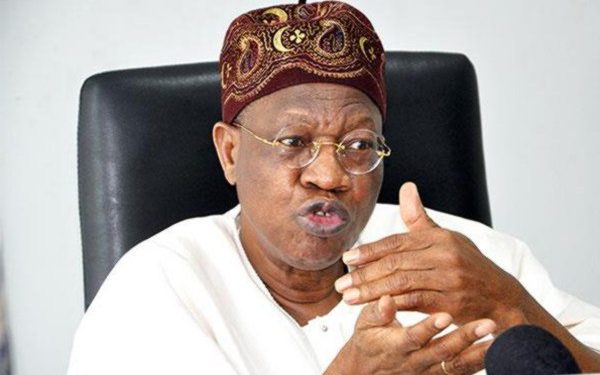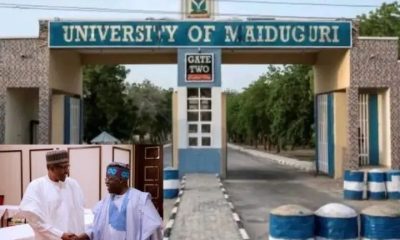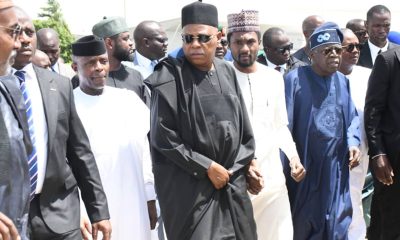NEWS
Buhari’s 2021 Performance Scorecard -Lai Mohammed

“Gentlemen, good morning, and thanks for honouring our invitation to this press conference, which in line with our tradition, we have called to brief you on the achievements of the Buhari Administration in 2021. In view of the long list of achievements and time constraints, we will go straight into the highlights and then provide you with a fuller list.
“Let me admit straightaway that the year has not been devoid of challenges.
For the outgoing year in particular, the major challenge has been that of insecurity. In spite of this and the usual economic challenges, especially the dwindling resources available to the government, the Administration has availed itself creditably, as we will be demonstrating shortly.“As I said in my introductory remarks, our biggest challenge in the outgoing year is in the area of security. Despite the enormity of the challenge, our military has continued to live up to their billing.
We owe them a debt of gratitude for their patriotism and sacrifice. We just can’t appreciate them enough, as you will soon see when I break down their achievements in the year under review.”
“To keep our country safe, the Armed Forces of Nigeria (AFN) has set up various operations across the country. These include the Joint Task Force (JTF) North East, tagged Operation HADIN KAI covering the North East region; the JTF SS, tagged Operation DELTA SAFE covering the South South region; the JTF NW, known as Operation HADARIN DAJI covering the North West region; Operation SAFE HAVEN covering Plateau, parts of Kaduna and Bauchi States; Operation WHIRL STROKE covering Benue, Nasarawa and Taraba States; JTF SW, referred to as Operation AWATSE and covering Lagos and Ogun States; Operation THUNDER STRIKE covering Abuja-Kaduna Highway and Operation WHIRL PUNCH covering parts of Kaduna State.
“Gentlemen, in the North East Zone under Operation HADIN KAI, a combination of kinetic and non-kinetic operations, coupled with a review of strategies, led to the neutralisation of over 1000 terrorists, rescue of 2000 civilians and the surrender of over 22,000 terrorists including their families. Many arms and ammunition were also recovered. This is in addition to destruction of several IED/bomb making factories of the ISWAP/BHT. Under Operation HADARIN DAJI in the North West, the conduct of offensive clearance operations, raids and air operations resulted in the neutralisation of about 427 bandits, arrest of 257 bandits, rescue of 897 civilians and recovery of 3,087 livestock.
“Similarly, Operation WHIRL PUNCH covering parts of Kaduna neutralised about 215 bandits, arrested 133 bandits, rescued 296 civilians and recovered 136 livestock, while Operation THUNDER STRIKE neutralised 36 bandits, arrested 74, rescued 296 civilians and recovery of 3,087 livestock.
Similarly, Operation WHIRL PUNCH covering parts of Kaduna neutralised about 215 bandits, arrested 133 bandits, rescued 296 civilians and recovered 136 livestock, while Operation THUNDER STRIKE neutralised 36 bandits, arrested 74, rescued 296 civilians and recovered 136 livestock.
In the North Central, raids and clearance operations conducted by Operation SAFE HAVEN neutralised 91 criminal elements, arrested 155 suspects, rescued 159 civilians and recovered 3,259 livestock.
“For its part, Operation WHIRL STROKE neutralised 158 criminals, arrested 151 suspects and rescued 183 civilians. Operation
DELTA SAFE in the South-South destroyed about 1,520 illegal refineries, confiscated 5,315 storage facilities and impounded 617 boats, amongst other items. Additionally, about 74,297,425 litres of Dual Purpose Kerosene (DPK), 41,971,693 litres of crude oil and 88,350 litres of PMS were recovered.
Furthermore, 174 trucks and 13 vessels were impounded while 755 illegal oil bunkerers were arrested and 153 assorted weapons recovered.
In the South West, patrols and clearance operations by troops of Operation AWATSE led to the arrest of 46 persons for various forms of criminalities while several vehicles, jerricans, motorcycles and electricity generators used for illegal bunkering were seized..
“The effectiveness of the military was enhanced by the leadership provided by President Muhammadu Buhari and the unwavering commitment of the armed forces and its leadership. The procurement of modern platforms for the armed forces has also gone a long way in raising the level of their operational readiness and efficiency, in addition to boosting their capabilities.
“During the period under review, the Nigerian Army procured 160 MRAPS, 150 trucks and 60 APCs to improve its equipment holding. Various kits were equally provided for troops. This is in addition to the provision of accommodation for troops and the recruitment of over 10,000 personnel into the Army.
“The Nigerian Navy (NN), for its part, commissioned the FALCON EYE Maritime Domain Awareness Capability, the third locally-built Seaward Defence Boat, one helicopter, 4 inshore patrol boats and 90 Rigid Hull Inflatable Boats. Over 1,500 personnel were recruited into the Navy during the year. The Nigerian Air Force (NAF) took delivery of 12 Super Tucanos and 3 JF-17 Thunder Fighter Aircraft and other platforms with which it has conducted several Air interdictions, provided close air support to ground troops and destroyed several illegal structures and equipment belonging to terrorists, bandits and other criminal elements.
“The Armed Forces of Nigeria has also contributed immensely to International peace and security efforts with its robust participation in the United Nations Multidimensional Integrated Stabilisation Mission in Mali (MINUSMA) and the regional initiative, the ECOWAS Military Intervention in Gambia (ECOMIG). The Nigerian military’s continued participation in these Missions has ensured their viability and sustenance towards achieving their military and political goals.
“Overall, the good news is that the military, in spite of its achievements, is not resting on its oars. The Military has assured that it is also poised, in fulfilment of its constitutional duties, to address the myriad of evolving contemporary threats, particularly as the 2023 elections draw nearer.
“Still on the fight against insecurity, the implementation of the community policing initiative of the current administration has led to the training of 25,000 constabularies in several police colleges
across the country. The successful officers who were trained on basic police duties, modern intelligence gathering techniques, rule of law, etc. were deployed to their Local Governments of Origin to aid in intelligence gathering and improve police visibility in their communities.
“Also, in an effort to improve the police/citizens ratio, 418 Cadet officers of regular course 3 were successfully graduated in June 2021 and deployed into the operational asset of the Nigeria Police Force. Through the Police Trust Fund, 200 Buffalo branded vehicles, bulletproof vest, protective helmets, drugs, and medical equipment as well as arms and ammunition, riot control equipment, and combat equipment were procured for the Police Special Weapon and Tactical Squad (SWAT). The Ministry of Police Affairs has also entered into a contract agreement for the supply of police Anti Riot Equipment with Poly Technology of China through a Government-to-Government arrangement at a cost of 44 million U.S. Dollars. These equipment will go a long way in boosting the capacity of the police to control civil unrest in the most efficient and civil manner.”
On the Economy, he said, “The recovery of the economy remained on a steady path throughout the year 2021. As you are aware, gentlemen, many countries around the world face unprecedented challenges, starting from 2020, as a result of the COVID-19 pandemic and Nigeria is no exception.
“The Nigerian economy was hit by the pandemic in mid-2020, and the economic disruptions led to a recession. The poor performance of the economy during the COVID-19 era affected output growth, trade, household welfare and livelihood.
However, this led to a quick response by the federal government with the rolling out of effective fiscal and monetary policies as well as health-related policies intended to curb the spread of the pandemic and mitigate the negative impact of the pandemic on the economy. This has yielded considerable results. For example, the country’s domestic growth in the first three quarters of 2021 was positive, recording real GDP of 0.51 percent in Q1, 5.01 percent in Q2 and 4.03 percent in Q3 2021.
“This was an improvement from a declining performance in the first three quarters of 2020 (which led to economic recession) at 1.87 percent in Q1, -6.10 percent in Q2 and -3.62 percent in Q3 2020. Nevertheless, the fourth quarter 2020 recorded a slight improvement of 0.11 percent, ushering in positive growth rates in the three quarters of 2021. This economic performance in 2021 shows a steady improvement in growth over the last three quarters of 2020, and this can be attributed to government policies and strategies such as the Economic Sustainability Plan; the N500 billion COVID-19 Crisis Intervention Fund etc.
“In the oil sector, real growth shows poorer performance in 2021, recording 2.21% (year-on-year) in Q1 2021, -12.65% in Q2 2021 and –10.73% in Q3 2021, from stronger growth of 5.06% in Q1 2020, -6.63% in Q2 2020, and -13.89% in Q3 2020. However, oil production in million barrel per day continued to decline in 2021, from 2.07mbpd in Q1 2020,1.81mbpd in Q2 2020, 1.67mbpd in Q3 2020 to 1.72mbpd in Q1 2021, 1.61mbpd in Q2 2021 and 1.57mbpd in Q3 2021. Non-oil sector indicated better performance of 0.79% in Q1 2021, 6.74% in Q2 2021 and 5.44% in Q3 2021, compared to 1.55% in Q1 2020, -6.05% in Q2 2020, and -2.51% in Q3 2020.
“In Foreign Trade, Nigeria witnessed dwindling performance in 2020, arising from trade restrictions on accounts of COVID-19 pandemic. Disruptions of trading activities driven by the pandemic
further weakened the balance of trade witnessed in Q4 2019 in the subsequent quarters.
“Consequently, total imports in the first three quarters of 2021 rose by 57.13%, from N13.97 in the corresponding quarters of 2020 to N21.95 trillion. Similarly, total exports grew by
40.62%, which was N13.12 trillion in the first three quarters of 2021, compared to N9.33trillion in the corresponding period, an indication of improved trading activities although with a deficit position. Over the same period crude oil export improved considerably at N10.03 trillion, compared to N6.92 trillion, showing a growth rate of 44.93%, while Non-oil exports grew by 21.17% – from N1.19trillion to N1.44trillion over the same period.
“Inflation rate has continued to decline on a year-on-year basis since April 2021 when 18.12% was recorded. Looking at the trend, a declining rate was recorded from 17.93% in May to 17.01% in August, 15.99% in October and 15.40% November 2021.
“It is projected that proper implementation of the proposed 2022 project of N17.13 trillion, and Medium-Term Expenditure Framework & Fiscal Strategy Paper 2022-2024 are likely to improve the performance of the economy.. Also, judicious implementation of the Petroleum Industry Act will likely improve oil production/sales stability; relatively high oil prices
will enhance revenue performance and budget implementation, while strengthening security will improve output growth of the economy.
On the oil and gas sector, Mohammed said, “Undoubtedly one of the greatest achievements of the Administration in 2021, and indeed in the past several decades, was recorded in the oil and gas sector, a sector very critical to the nation’s economic well-being.”
NEWS
Enhancing Agricultural Productivity Through Research

By Abachi Ungbo
Agriculture is an important economic activity that is providing employment to a huge segment of the Nigeria population and also contributing to the nation’s Gross Domestic Product (GDP).It is dominated by small holders on whose thin shoulders the needs of the entire population rest upon.
The productivity of their farmlands is small and their income hardly commensurate with the huge effort they apply. They are overwhelmed by not a few challenges which have continued to haunt the nation in general.No doubt, Nigeria agriculture is struggling to unleash its full capacity despite many efforts. It is worrying that the overall productivity of the sector hasn’t dramatically improved in the face of growing population, nutritional deficiency, effect of climate change, volatile food prices and pervasive poverty.Agricultural production continues to be hobbled by familiar challenges associated with low crop yield, incidence of pest and diseases, post- harvesting losses, plummeting soil fertility etcThe poor state of agriculture underscores the necessity for extraordinary approaches and strategies in circumventing the host of challenges to unlock the boundless capacity of agriculture to ensure it serve its purposes.In 2013 in Maputo, the African Union (AU) under the Comprehensive Africa Agriculture Development Program (CAADP) laid out an elaborate plan for the development of Africa’s agriculture with an agreement by member states for the allocation of 10% of public expenditure to agriculture and an 6% annual growth of the sector. In 2014, under the Malabo declaration, member states reaffirmed their commitment to the vision.Interestingly, meeting the goal as enshrined in the CAADP remains a tall order! A case in point is the 2025 national budget. Agriculture was allotted 826.5 billion naira which constituted about 1.73% of the total budget of 47.97 trillion naira – a far cry from the agreement. In the budget, 40 research institutes were allocated 126.03 billion naira while federal universities of agriculture got 54.38 billion.The allocation to the institutions is paltry judging from the huge financial requirement inherent in undertaking any meaningful research activity and in running the institutions. The Pillar IV of the CAADP placed emphasis on agricultural Research and Development (R&D).A vibrant research- led approach stands as a conspicuous missing link in the chain of agricultural production. We are witnesses to the infinite human ingenuity which has always been brought to bear in making agriculture responsive to emerging challenges leading to massive revolution in the sector through a multidisciplinary approach.Research has always provided answers to challenging questions that have changed the trajectory of agriculture. Agricultural research ensures that new technologies, techniques and practices are developed to improve productivity.Instructively, improving agricultural productivity is a foolproof strategy for promoting inclusive economic development and reducing poverty. Through the strategy, the income of farm households is ramped up and food cost curtailed which serves as a cushion to non-farm households who are known to expend a massive amount of their income on food.Agricultural research has a long history in Nigeria leading to the establishment of many research institutes and universities of agriculture. As well as a body known as Agricultural Research Council of Nigeria saddled with the responsibility of supervising and coordinating agricultural research and extension activities.In effect, the country has one the most elaborate National Agricultural Research Systems (NARSs) in Africa.Through public funding the institutions have recorded massive achievement. However, they are currently a shadow of their former selves. Their current state tells a sad story of neglect and underfunding. The entire institutions have a similitude of challenges which has continued to limit the actualization of their mandate.The institution needs to be well funded to promote productivity, sustainable growth and general transformation of the sector. It is against this background, that the recent National Agricultural Development Fund (NADF) report on the baseline survey and need assessment carried out on 16 agricultural institutions and 17 colleges of agriculture requires massive attention in order to place the research institutions on the path of glory.Research and Development can never be successful without sufficient funding. The effectiveness and efficiency of the research can be narrowed to the generous monetary allocation that will cover the operating costs of the institutions, salaries, training and capacity building, investment in modern laboratories, equipment, relevant research facilities and data management system.The entire approach to research needs to be attractive enough to draw and retain talents. The place of accountability and transparency cannot easily be discounted in the entire management system of the research institutions. Also, is the need for strengthening the extension system. Access to new technology and practices by the end users through the agency of a vibrant extension system is imperative and must have its wheels adequately oiled.In the final analysis, productivity will further be enhanced through the synthesis of improved agricultural research funding and the continuation of policy reforms.Abachi Ungbo, abachi007@yahoo.comNEWS
Gov Adeleke Deploys 1,750 Imole Teachers Corps to Osun Schools

From Ayinde Akintade, Osogbo
As financial constraints delay planned mass teachers’ recruitment, Governor Ademola Adeleke has deployed a total of One Thousand, Seven Hundred and Fifty Imole Youth Corps teachers to primary and secondary schools across Osun state.The Governor is also seeking more deployment of members of the National Youth Service Corps to Osun state for posting to schools in the state.
These measures are stop gap actions to address personnel shortage in some schools and to prepare ground for the expansion of teaching personnel in critical subject areas. The Imole Youth Corps members posted to the schools hold Nigeria Certificate of Education and University degree qualifications and are already functioning in various schools in the state.The breakdown of the posting are as follows: Ayedaade – 65; Atakumosa East 35; Atakumosa west 43; Ayedire 47; Boluwaduro 44; Boripe 33; Ede North 74; Ede South 66; Egbedore 56; Ejigbo 87; Ife central 61; Ife East 28; Ife North 39; Ife South 50.Others are Ifedayo- 58; Ifelodun -58; Ila Orangun- 83; Ilesa East -61; Ilesa West- 68; Irepodun -43; Irewole- 74; Isokan -19; Iwo -87; Obokun- 50; Odo Otin -77; Ola Oluwa -43; Olorunda- 44; Oriade -106; Orolu -41; Osogbo -80; and Modakeke Area Office -33.Governor Adeleke in his response to the development reaffirmed the determination of the government to strengthen the school system through multiple innovations to further improve Osun attainment in national and local examinations.According to the Governor, Osun ranking in national examination will soon hit between number 1 to 3 from the present 7th position, promising that teachers recruitment will be achieved before the next elections.“We will recruit more teachers once the financial climate improves. We are however committed to ensuring a narrowing of the personnel gap in our schools. That is why we innovated on the Imole Teachers Corps.“We will train and retrain those presently in service. I commend the principals and great members of the Nigerian Union of Teachers. We appreciate the Parents-Teachers Association. “We will Continue to improve the learning environment for our pupils and students. To this end, we commend the private school operators. They are a critical sector in the positive development of education in our dear state”, the Governor was quoted as saying.NEWS
NAICOM Issues Guidelines for Insurtech Operations in Nigeria

By Tony Obiechina, Abuja
The National Insurance Commission (NAICOM) has officially issued operational guidelines for Insurtech businesses in Nigeria, following extensive stakeholder consultation and engagement.The guidelines, effective from August 1, are designed to provide a clear and unified regulatory framework for the licensing, operations and supervision of Insurtech firms in Nigeria.
The guidelines aim to foster innovation that can lead to the development of new and innovative insurance products and services; ensure consumer protection and improve consumer experience, prioritizing consumer interests and providing better services and provide clarity on regulatory requirements, reducing uncertainty and ambiguity. Others were, help build trust and confidence in the Insurtech sector, driving growth and adoption; and advance digital transformation within the Nigerian insurance sector.Key Objectives of the Guidelines include, promoting the growth and development of Insurtech in Nigeria; establishing regulatory standards for Insurtech setup and operations and encouraging responsible innovation while safeguarding consumer interests.Others are, defining general product features specific to Insurtech; providing a licensing structure for both Partnering and Standalone Insurtech firms and facilitating the transition of eligible operators into fully licensed standalone Insurtech entities, as well as supporting Nigeria’s broader digital economy and fintech ecosystem.The Application are categorised into partnering Insurtech permitted to transact specific classes of insurance in collaboration with licensed insurers; Standalone Insurtech: permitted to transact the categories of insurance as may be specified in its license, excluding special risk products such as Oil and Gas Insurance, Marine and Aviation Insurance, Retirement Life Annuity and insurances of government assets and liabilities for Ministries, Departments and Agencies.Prospective operators must submit applications in accordance with the procedures outlined in Schedule I of the Guidelines. NAICOM reserves the right to grant licenses with conditions deemed necessary under existing laws and this new regulatory framework.Insurtech firms must comply with provisions related to risk management, investment practices, actuarial standards, outsourcing, and other key operational parameters as detailed in the Commission’s Prudential Guidelines.Disputes between Insurtechs and partner insurers must first follow arbitration protocols outlined in their agreements before approaching NAICOM. Consumers may refer unresolved issues from insurance transactions directly to the Commission for review and resolution.Deadline for all existing insurance institutions and Insurtech firms operating under any arrangement classified as Insurtech must fully comply with these Guidelines within 30 days of the effective date.




















